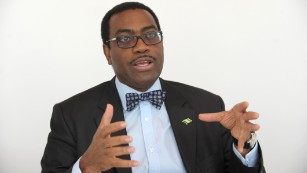AfDB NEWS & EVENTS
by Stefan Nalletamby
16-Apr-2020
 As the COVID-19 pandemic continues to have a devastating impact globally, the African continent, while less affected, is preparing to undergo its own severe social and economic crisis. As of April 7, over 10,000 cases have been reported across 52 countries in Africa (less than 1% of cases globally).
As the COVID-19 pandemic continues to have a devastating impact globally, the African continent, while less affected, is preparing to undergo its own severe social and economic crisis. As of April 7, over 10,000 cases have been reported across 52 countries in Africa (less than 1% of cases globally).
Yet despite the slow onset, Africa’s fragile health systems will be overwhelmed if the virus continues to spread. To avoid this scenario, governments are implementing contingency measures with striking collateral damage in the form of shops and factories closing, workers being sent home, and jobs being cut, with the effect that an economic recession is looming.
In response, the African Development Bank has raised an exceptional $3 billion, three-year bond to help alleviate the economic and social impact of the COVID-19 pandemic. A portion of these funds will help finance access to health and other essential goods and services as well as the infrastructure needed to address the crisis and create favourable conditions for resilience.
The Bank believes that digital technologies can and will play a critical role in strengthening resilience by enabling fast responses to this crisis while helping alleviate its impact.
There are a number of specific use cases where digital technologies help create an enabling environment for human resilience during these difficult times.
A shift to a cashless economy
Physical money currently acts as a vector for the virus’ spread whereas technology makes payments possible and safe. Governments and start-ups across Africa are implementing measures to shift payment transactions toward mobile money and away from cash, as recommended by the World Health Organization. A case in point is Kenya, the pioneer of mobile money, where the payments industry has collaborated to ensure that digital payments can be made across the board, especially by the most vulnerable. For a three-month period, digital transactions below 1,000 Kenya Shillings ($10) will be free.
Ghana too has instituted measures to drive digital payments and combat the virus. The Central Bank of Ghana has directed mobile money providers to waive fees on transactions of 100 Ghana Cedis ($18) or less and has allowed for the opening of mobile money accounts using existing subscriber registrations with mobile operators. South African fintech start-ups are encouraging the use of contact-less payments through point-of-sale devices.
Online business (e-commerce)
Online business and e-commerce platforms help maintain social distancing and reduce the potential spread of COVID-19. Online delivery applications have become the ideal medium to order food, groceries and medical supplies. E-commerce platforms, whether web-or app-based, are gaining new users.
Digital health infrastructure is helping communities safely navigate the pandemic. Telemedicine platforms based on chatbots enable people to ask questions about symptoms and treatment. These platforms also allow the public to assess the probability of infection. Other innovations, such as medical tips generated via sms or WhatsApp, advise recipients on responsible behaviors. Chatbots can also direct patients to nearby hospitals and enable healthcare professionals to track the pandemic’s spread in real-time.
Digital work and learning spaces linked by internet infrastructure and virtual platforms have increasingly become a mainstay for businesses and learning institutions as they connect remote workers and students across countries, regions and globally.
The pandemic has spurred innovative approaches that are helping society respond to and minimize its impact. Even before the global pandemic however, digital technology in general and digital financial services in particular had begun accelerating economic resilience, particularly for the most vulnerable. In 2019, the Bank partnered with the Bill & Melinda Gates Foundation, the Government of Luxembourg and Agence Française de Développement to set up the Africa Digital Financial Inclusion Facility (ADFI). ADFI is a blended finance vehicle that aims to scale up digital financial services in Africa to accelerate financial inclusion and ensure that digital financial systems include and empower everyone, especially women.
Boost Africa is another initiative that is leveraging technology to spur inclusive growth. A partnership of the Bank, the European Commission and the European investment Bank, Boost Africa uses venture capital to support high growth SMEs that are tech-enabled and driven by disruptive technologies.
The Social Impact Investment Program (SIIPA), a joint initiative of the Bank and the European Commission, leverages technology to deliver social goods and services to underserved populations.
The COVID-19 pandemic is severe, and its economic effects are only just beginning to be felt in Africa. Still, innovative solutions and technology tools offer a glimmer of hope for human efforts to boost resilience and slow or halt the spread of the virus. We must seize upon the current urgency to rapidly develop and deploy digital services that are universal and inclusive, and which will help shield Africa’s most vulnerable from future economic shocks.












